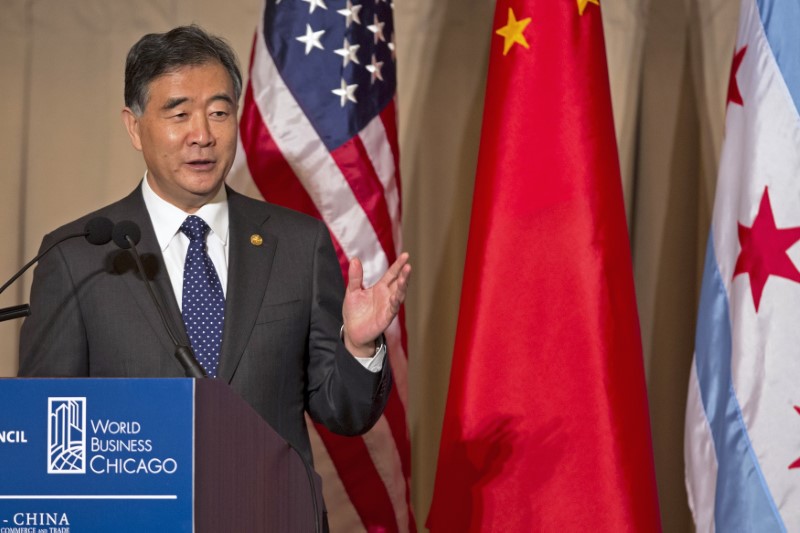 © Reuters. FILE PHOTO: Chinese Vice Premier Wang Yang speaks at the U.S.-China: A Shared Vision of Global Economic Partnership event in Chicago
© Reuters. FILE PHOTO: Chinese Vice Premier Wang Yang speaks at the U.S.-China: A Shared Vision of Global Economic Partnership event in ChicagoBEIJING (Reuters) – China should improve the business environment for foreign investors and further widen access to its services sector, Vice Premier Wang Yang wrote in the official People’s Daily, as the country seeks to raise its competitiveness in the global economy.
Wang was recently named a member of the Communist Party’s Politburo Standing Committee, the height of power in China, at the party’s twice-a-decade national congress.
Wang said China should also bring in more foreign technology and business expertise, not just foreign capital, while also stepping up its outbound investment and encouraging firms to expand globally.
“The domestic and international trends facing (economic) opening are undergoing deep and complex changes. The opportunities and challenges are unprecedented, but the opportunities are greater than the challenges,” Wang wrote.
At the recently concluded twice-a-decade Communist Party congress, Chinese President Xi Jinping called for “making new ground in pursuing opening up on all fronts”, and has pledged to allow greater access to China’s markets for foreign investors.
China has been accused of unfairly subsidizing exports and of restricting foreign access to its domestic market, with U.S. President Donald Trump often complaining of the massive trade surplus China runs with the United States.
During his trip to Beijing this week, Trump again said trade between the two nations was unfair, while Xi said the Chinese economy would become increasingly open and transparent to foreign firms, including those from the United States.
Wang wrote that China should compete for global capital not by offering preferential policies, but by creating a fair, transparent, law-based and predictable business environment.
China must also protect intellectual property, not require technology transfer as a condition of gaining market access, and should treat domestic and foreign firms equally in government procurement and the country’s “China 2025” plan to upgrade its manufacturing sector, Wang wrote.
China must focus on higher-quality production and building competitive advantages in technology, standards and brands as the “traditional development model has hit a bottleneck”, Wang wrote.
“Labor costs continue to rise, resource constraints are increasingly tight, the load on the environment is reaching a limit, and traditional competitive advantages of opening have weakened,” Wang wrote, while adding that China’s large market, good infrastructure and environment for innovation give it advantages.
In line with regular pledges by government officials to open more sectors to foreign firms, Wang said China would focus on orderly opening of the financial, education, culture, and health care industries, while lowering market entry limitations on e-commerce, logistics, early childhood education and elderly care.
Source: Investing.com




























